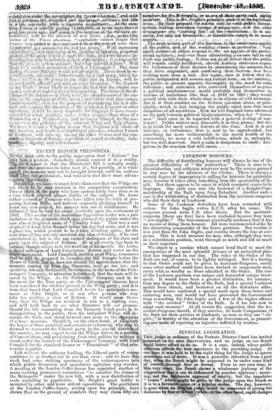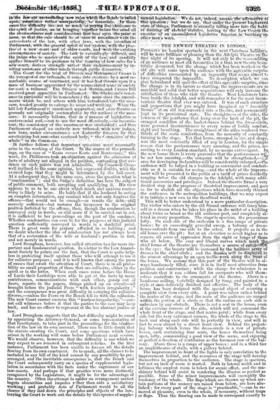Tim judge in ordinary of the Probate Divorce Court has
invited comment on his own observations and. no judge on our Bench could better afford to do so. It is a case, indeed, where public criticism affords the best assistance to the presiding judge. At one time it was held to be the right thing for the Judge to ignore comments out of doors. It was a punctilio inherited from a past day, when the Bench might be supposed to be under some kind of control through fear or favour. Even in our own time, in this very court, the Bench shows a wholesome jealousy of the supposition that it can be influenced by popular applause ; mean- ing, not the deliberate approval of society, but the impulsive " bravo " which might be gifea to the judge upon the Bench as it is to a favourite actor or a popular orator. The day, however, is gone when an English judge could be suspected of giving his decisions by fear or faviair ; while, or the other hand, rapid changes Iwo* akiwattisstssisititestr*sw raist,i lotigPliteitiablrisifem 1 .dpovi-obssiirdei.ismeislwestwegaylateltsyliAglife. ,1ato3 I eriscautheildillicatrWitin ateck,act,tiriapityslyk Atikpolikliow.ti.., tlii(spirtit clfajustieeTaWitilirittrilieteWheitteratiOtklitdnflittr ' the erretImstan4estitrolutemirlieletatitia tgitifhtiki'Vpifn, at4rdsfltt isintel, sii gatilliii,ralleilis1itvirillThe;tridolitfet114 iffeberkaki4e ifiklie : antecedents of the law, with other laws, with the interitteti2eit pitritareem4 oivtitirthir genera/ i *dr 43 f lftiillstWItith)the irl.a.c- -ti oefof :Is ; Inativ! fistatfit Fatal f.of4,61t1Wbotir4, lain& f *it& i die eirRilig -cirhma still tewbf tiVietyl Ale, triako(Welt4dIn glyAtifltertlii 'gild ihe j,ide vrhcoist•7taliteltL4tifolt1ttie ispirlit fiSfltittflilaWlaildiTercididly 4tiliesuhtiiingf101 Li& ilia-lath* ittoihg fr 4W1 ftilesithr a itogri-oourk;-; diltivor f [Atoll i ,,Pitheic.thAtiAlilibilticaSsiiient by in- *Hug aisaistau4e of Pthkunillattsi thrOtigti iiiiblIc4i4eiiiiffek • '19 'The ' 0011Vt l' fin; I Die; ItIri Ail Of ..DIVerdeatindiMaffiiiblini eV Cliuses is tilt lynitngetittif clir buittiKiit'tire itit4 ekiSterieetyld isievili inarkriblei itnarte et €thilittinentparidil it II al4 ilfad(fltiatml, #petiqt 'it vitas of ibusinesiiraggraWilettibPtIrdqtettimilitatedqwitint'lli'arabielk -forisuelitia,lifilmn'all t the 'Divercelltindqgb4iltunkied CaltiStit'i§ill Teceiveld meat cisiteii; . iiii; iParliaillent, of WPOI4sto[1304 ireSist- lancolixiiit-tidnitst will bieienienaliciedAlie itifft4i4iikei ihe nrhaff- Mmitg; ivshixih.,be,-and others! witlY Illnii,71.rdi'oillitiddiintbt 010 MeaL sir*, tondettkretttlk to enlarge its abbpreoairdskitilarg:' t Wli-eiil the biltdefeParliamieit ;;sartetioned..sUpitihridort;4611 Oen'. illvciree on krotnitlai-; rid ; brigiimflif f Otititetheated -IfyJMititit141.4,Ofttli'e. pietiL sure.1,:. It necessatilyiEfelloWS; that inliirionierSP6folegialatton So
contrevetsidl and;;IJ-Lirat toileee the wordOffensively', ,''-dendincorisis-
taiitPtlie:eonsisteneY of the I entietnient Wsig, tiat1661641, and:thus Prklittilientl Shape& r int 1 ihrtirely InCiv gigiltinat;0444thifielk'jii4es, .tieiv laves, tintloic eireunistiiiidew; I mit i 1 ilistirkki? .1 fdieSeen - lay " that adiutinking 14;ttnitewliat 'ebuf LW/ rb,1"‘ the; Caitt ..t' of the olitalvAliili the dt)iimori,w:-.,-c.;,111faci bhp) r: itL,fir .,-:, • • -nib filitherlifollWarlha* initiiktantiltn'estikig 1 iiittst' • necessarily arise in the working of the Certirt.thiliiliV &urge PfAilielfoceed- ings, on the ease of "Keats versus Keats and Montezuma," this week, Dr. Phillimore4*-rinfobjf,ction, against the admission of facts of adultery, R.4 alNged in the petition, eante„ufliug that evi- dence on such!..poinnta, was not affmissible. ;•:-Ireressivell Cress-
well inclined to the same opinion, but expressed doubts, with the avowed hope thai they might be determined, by the full court. At a subsequent 'day, in the same case, arose the question what is "condonation"; and the Tudge's definition has been the siibject of public comment, both accepting and qualifying it. His view appears to us to be one about, which much and aniions contro- versy is likely to arise. Ile holds that if the husband be acting on complete information, any conduct which not only forgives the offence—that would not he enough—or remits the debt—still scarcely sufficient—but restores the trespasser to the original positicin forfeited by the offence, then, though the Condonation be conveyed only in words, or still more if it be carried out in act, it is sufficient to bar proceedings on. the part of the condoner. Whether condonation can ever be for the purposes of this judicial question sufficiently conveyed in words is a doubtful point. There is great room for perjury afforded in so holding; and we doubt whether the idea of condonation has not always been that of a restoration of the wife or husband's position in fact, and not merely in words. Lord Brougham, however, has called attention to a far more im- portant and fundamental question. Inn letter to the Law Amend- ment Society he points out the fact, that the Court is quite help- less in protecting itself against those who will' attempt to use it for collusive purposes ; and it is well known that among the press - of causes that await the attention of Court, there is in all proba- bllity no small proportion of those that are collusive, either in the spirit or in the letter. When such eases come before the House of Lords their Lordships were able to get at the facts by many contrivances communications with each other, gossip out of doors, reports in the papers, things picked up on circuit—all brought before the judicial Peers "with fearless irregularity)" and the consequence was great difficulty in earrying.the collusive divorce,—unless the Peers on the Bench fell in with the collusion. The new Court cannot exercise this "fearless irregularity,"—cau- not call witnesses before it that the parties to the case may keep back, and has no officer to represent at the bar abstract justice or law.
Lord Brougham suggests that the last difficulty might be cured b_y appointing the Attorney-General, or some representative of that functionary, to take part in the proceedings for the vindica- tion of the law on its own account. There can be little doubt that the statute creating the Court, and some questions which have
arisen in the working will come before Parliament next session. We would observe, however, that the difficulty is one which we may expect to see renewed in subsequent reforms. In the first instance, Parliament has been unable to foresee all the details flowing from its own enactment. So to speak, al/the clauses to be included in any bill of the kind cannot by any possibility be pre-. arranged and the inevitable consequence is that the. Bench and the Court subsequently carry on a species Of supplemental legis- lation in accordance with the facts under' the cognizance of our law-courts. And perhaps if that pracgee were more distinctly recognized by the Legislature, it mi M be for the advantage of the country. Often the attempt to rder an arrangement perfect begets obscurities and impedes r'ither than aids a satisfactory working ; and probably Acts ot Parliament would be all the clearer if they laid down the unciples and objects of the law, leaving the Court to work out he 'details by this-species-of supple-
*hit hwit'stibite; itmv ab-) riaatilookutiliikt
Arthe =Ott VVthin5ftlitit 114kiiillk f iefnakihitiga /WW1 5iitto
-eYeriiir I dfleteir Atireel' slatiVe • Otitiiit !.... err 0) 1.1;11 .e,11 c



























 Previous page
Previous page